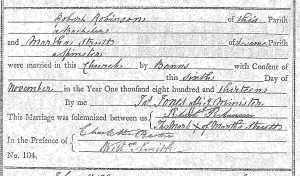I don’t know what persuades a man, his four children and heavily pregnant wife onto a small, two decked ship for a three-month voyage of over 8,000 miles with only the hope of a better life, but that is precisely where Robert Robinson and his family found themselves as the “Brilliant” left Gravesend.
Robert had been born the youngest child of Philip Robinson and Charlotte Erith on 24 October 1794 in Gillingham, Kent.
![]()
He had just turned 19 when he married Martha Rosina Strutt at St Margaret’s, Rochester on 6 Nov 1813. Their first child, Louisa, was born 3 months later.

A butcher by trade, Robert was 25 and living with his young family in Minster-in-Sheppey when they joined party No 46 of the official government scheme to encourage emigration to the Cape. The party was led by James Thomas Erith, a baker from Peckham, and Robert’s cousin (James’s father was William Erith, Charlotte’s brother).
Robert’s brother James and his family were also due to travel and one can only speculate as to why they stayed behind but only six weeks before they were to leave, their father Philip had died. Perhaps James felt duty bound to remain in England; his father was only a labourer and his mother would possibly be destitute without him, although there were other children. Either way, it ultimately did not work out well for Charlotte; she died in the Chatham workhouse on 11 November 1838. We have since discovered that James’ wife, Charlotte, also died – in March 1820 – so must have been too ill to travel. See this post.
The Robinson family embarked the Brilliant, captained by W. Bothwell, at Deptford and departed Gravesend on 15 February 1820, arriving in Simon’s Bay (Cape Town) on April 30 and Algoa Bay (Port Elizabeth) on May 15. Their fifth child, William, was born while en-route to Cape Town. Incidentally, William became a renowned educator, founding the first school at Potchefstroom. He also became Landdrost (Chief Magistrate) at Rustenburg and chairman of the committee that drew up the South African Constitution in 1856. He stood for President of the Republic in 1872 losing to Rev. T.F. Burgers. At the last count he had 109 grandchildren and was the last surviving 1820 Settler when he died in 1912 aged 93.
However, on arrival at Algoa Bay, things were far less promising. The Erith party were initially allocated land then forming part of the Bathurst commonage on the left bank of the Torrens River but were shortly moved to Waay Plaates, a location at the source of the Kaffir Kraal River rejected by Damant’s party. They named it New Botany Bay. Things did not go well for the party. It may be that Robert and James started falling out before they even reached the Cape, but they were soon at loggerheads on the trek to their allotted land and relations between the cousins was to get steadily worse, with Erith ultimately refusing to draw rations for Robert or his family. The rest of Erith’s men did not remain with him for long either; they applied successfully to have their service agreements cancelled. By the end of 1820 Robert had successfully gained a Colonial Pass, necessary to move away from their assigned location. The Erith party had dispersed by 1823 and the Government resumed the abandoned land. (Erith and his wife subsequently embarked on a long campaign to gain redress for what they saw as wrongs inflicted on them by the colonial authorities – see this post).
The Robinsons had extremely modest resources and eventually some dozen mouths to feed. The family moved Northwest to land along the Great Fish River and lived alongside neighbours of Dutch origin on the eastern frontier of the new colony. The Robinson children grew up bilingual and at least four of them married into Dutch families. In 1825 Robert bought some land in Somerset East where No. 41 Pierre Du Toit’s Place now stands but later settled in Albany, near Grahamstown. After several years of gradual acquisition, Robert amassed an estate of some 1,000 acres although this was hardly extensive. He was not a very successful farmer, but he was able to supplement his income working as a builder in the growing town of Cradock.
After their arrival in South Africa with their five children under five years (Louisa (5), Robert (4), John (2), Philip (1), William (infant)), Robert and Martha had ten more children: totalling six sons and nine daughters in all, the youngest of whom, born in 1840 would go on to become a major player in the gold and diamond fields of South Africa and be made a Baronet; Sir Joseph Benjamin Robinson.
Robert died on 16 April 1886, in Cradock.
(updated 15/4/2018)
One comment